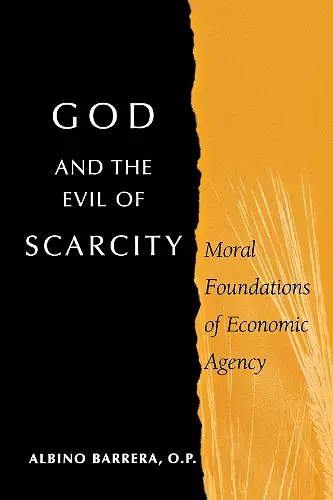God and the Evil of Scarcity
Moral Foundations of Economic Agency
Format:Paperback
Publisher:University of Notre Dame Press
Published:15th Nov '05
Currently unavailable, and unfortunately no date known when it will be back
This paperback is available in another edition too:
- Hardback£86.00(9780268021924)

In his celebrated Essay on Population, Thomas Malthus raised the puzzle of why a benevolent Creator would permit material scarcity in human existence. Albino Barrera revisits this question using Thomas Aquinas’s metaphysics of participation and Sacred Scripture’s invitation to covenant fidelity and kingdom discipleship as analytical lenses with which to examine the seeming incongruity of scarcity in God’s providence. Barrera concludes that scarcity turns out to be a signal opportunity for economic agency to receive, internalize, and communicate God’s goodness and righteousness within the human community.
Written for theologians, philosophers, social scientists, and policymakers interested in the theological and philosophical foundations of economics, this study argues that precarious, subsistence living is not an immutable law of nature. Rather, such a chronic, dismal condition reflects personal and collective moral failure. In this carefully researched study, Barrera argues that scarcity serves as an occasion for God to provide for us through each other and that there are strong metaphysical and scriptural warrants for enacting progressive social policies for a better sharing of the goods of the earth.
“. . . reports a great deal of recent biblical scholarship . . . my summary of Fr. Barrera's argument must fail to do justice to its many virtues. Part II is scholarly, thorough, and 'catholic' in the best and truest sense of that much-contested world.” —Faith and Economics
“A hallmark of Barrera's writing is that he slowly builds all the elements he uses to make his arguments. Often he proceeds so carefully that larger points are established through series of mini-treatises, many of which, due to the depth of their analysis, are worth reading in their own right.” —Review of Social Economy
“The book is masterfully crafted and beautifully written, and it is important reading not only for scholars of economic ethics but also for students in need of an introduction to questions of scarcity and theodicy. Barrera also has a gift for demonstrating the significance of methodology in theological ethics, which can be an inspiration to those seeking to make sense of the larger conversation and to locate their own thinking within it.” —Journal of the Society of Christian Ethics
“Albino Barrera, an economist and theologian at Providence college, skillfully and lucidly revistis scarcity with an eye toward encouraging a mindset of economic agency in place of Malthusian resignation. The book is masterfully crafted and beautifully written, and it is important reading not only for scholars of economic ethics but also for students in need of an introduction to questions of scarcity and theodicy. Barrera also has a gift for demonstrating the significance of methodology in theological ethics, which can be an inspiration to those seeking to make sense of the larger conversation and to locate their own thinking within it.” —Christian Ethics
“The overall impression one is left with is that Barrera is engaged in a much-needed project. His sophistication in both economics and theological ethics allows him to carry forward a conversation that has too often stayed at the level of vague generalities about capitalism and socialism, or well-meaning but not particularly strategic pleas on behalf of the poor.” —The Thomist
“The book is fascinating in many ways. First, I cannot recall anyone taking up the issue of scarcity as theodicy since Malthus. Second, his use of Thomistic thought here is quite clever. Third, his use of Pauline theology is unusual. . . . Finally, by addressing scarcity within the framework of theodicy, Barrera asks a more specific question than a general question of theodicy does.” —Christian Scholar's Review
“How do we understand God's purpose in a world of material scarcity? Rather than accept the solutions of Malthus, Sumner and Paley, that material want encourages striving and discipline, Barrera contends that God intends that scarcity can be eliminated through human cooperation, humanity's role as co-creator. Basing his argument upon biblical sources, both Testaments, as well as the thought of Aquinas, he says that God's will is a world with care. He adds that scarcity is accidental . . .” —Horizons
"Written for theologians, philosophers, social scientists, and policymakers interested in theological foundations of economics, this book argues that precarious subsistence living is not an immutable law of nature. Rather, such a chronic, dismal condition reflects personal and collective moral failure. The book argues that scarcity serves as an occasion for God to provide for us through each other." —Abstracts of Public Administration, Development and Environment
“Barrera’s intention is to criticize Malthus and to propose a different explanation of the reality of scarcity. Barrera’s book certainly provides a foundation for a theology of economic agency. It is a book that I highly recommend to scholars concerend with a broader approach to scholarship.” —Journal of Markets and Morality
“There are comparatively few scholars who are well versed in both theology and economics, but Barrera is clearly one of them. . . . [God and the Evil of Scarcity] is written in a clear and easy style, and has good headings, structure and index. It engages seriously with economics as well as being rich in theological insight, and can be highly commended. . . .” —Theology
ISBN: 9780268021931
Dimensions: 229mm x 152mm x 16mm
Weight: unknown
306 pages